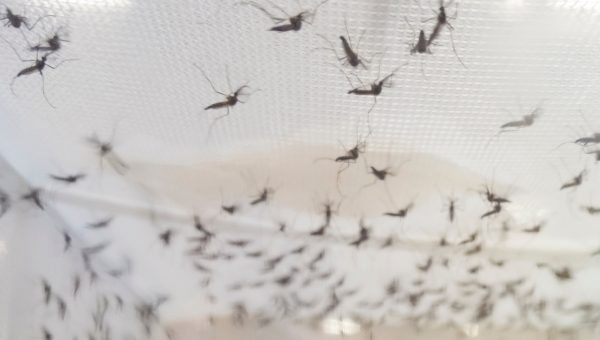30
Nov
Viruses Shown to Be Effective Biological Control

(Beyond Pesticides, November 30, 2023) Scientists at Minami Kyushu University in Japan have made a groundbreaking discovery of a new biological control for a target insect. They have identified a virus in tobacco cutworms that kills males, creating all-female generations. The discovery was described in a recent issue of the Proceedings of the National Academies of Sciences and The New York Times as evidence that multiple viruses have evolved to kill male insects.
This “male-killing” virus could be added to the growing attempts to control unwanted insects with biological, as distinguished from genetically engineered (GE) solutions. Efforts range from the introduction of natural predators, to radiation-based sterilization of insects, CRISPR-based genetic mutations, and other techniques. While the GE approach has run into controversy because of unanswered questions associated with their release into natural ecosystems, some approaches have also run into resistance problems. Nearly a decade ago, researchers found armyworm resistance to Bacillus thuringiensis (Bt)-incorporated genetically engineered (GE) maize in the southeastern region of the U.S., calling this evolution of insect resistance to a naturally occurring soil bacterium engineered into crops “a serious threat to the sustainability of this technology.”
The general population knows to avoid eating raw eggs because the bacteria salmonella, can live inside chicken eggs. Similarly, scientists have long known that microbes can live in insects’ eggs. One of the scientists, Daisuke Kageyama, PhD, explained that the Wolbachia bacteria, another male-killer, is propagated through females. Dr. Kageyama told the The New York Times, “Males are useless” because they cannot help propagate the microbe, so the bacteria prevents male eggs from hatching.
The scientists in Japan discovered the new male-killing virus in tobacco cutworms and called it SIMKV. The New York Times described the discovery of the virus as being very lucky that research technician Misato Terao stumbled upon the caterpillars while cleaning the greenhouse and placed them in Yoshinori Shintani’s lab. Even luckier was the temperature zone that enabled the virus to impact the resulting all-female generation of moths.
Anne Duplouy, PhD, an evolutionary biologist at the University of Helsinki specializing in the study of microbial symbionts in insects, suggests that there is a diminishing window of opportunity for humanity to glean insights from these microbes sensitive to temperature changes. Due to climate change, she said, “we are likely to be losing many of these interactions” before they can be documented.
The authors of the study believe the identification of this male-killing virus in insects has the potential to revolutionize methods for managing agricultural pests and disease-carrying insects. Conventional pest control approaches rely on the use of toxic pesticides, which can adversely affect the environment and human health.
Many scientists believe a “female-killer” virus could be a more ecologically friendly approach to pest control. However, these biological controls do not always consider the entirety of a systems-based organic approach that focuses on the root causes of pest problems. To see a more systematic approach to mosquito control, see the city of Boulder, Colorado’s mosquito management plan, which includes Living with Mosquitoes and Ecological Mosquito Management.
As scientists delve deeper into the study of the relationships between mosquitos and the interactions of species in an ecosystem, there is the prospect of uncovering novel strategies for pest and disease control that are both more efficacious and less environmentally harmful.
The revelation of the male-killing virus in insects serves as a poignant reminder of the extraordinary biodiversity of life on Earth. As scientists persist in their exploration of biological control, they are bound to reveal many more captivating discoveries that will contribute to a better understanding of the natural world.
As The New York Times wrote in November 2018, “The Insect Apocalypse is Here.” Karen Lipps, PhD, and other scientists and researchers observed the consequences for ecosystems that experience the loss of one species and its cascading impact on other species. Dr. Lipps writes about the massive loss of frogs and other amphibians due to a fungus and its resulting increase in insect populations. This, in turn, decreased snake populations (which would have preyed on the frogs).
In industrial agriculture, the typical approach to addressing pest issues often involves prioritizing the destruction of a single “pest” using a pesticide as the primary solution. This practice results in a cascade of harmful effects throughout the food chain, impacting both prey and predator as they fall victim to the broad-spectrum pesticides. While it intuitively makes sense that pesticides can affect more than just their intended insect targets, the extent of this issue came to light through a study conducted by German researchers and published in PLOS One. Their findings, based on 27 years of trapping flying insects, reveals a staggering 75% decline in overall biomass during the study period.
To learn more about using biological control for your yard and outdoor pest problems, make sure the use of any pest management fits within a broader, structured, ecological approach to pest management. Use Beyond Pesticides ManageSafe webpage to assist your research on biological controls.
All unattributed positions and opinions in this piece are those of Beyond Pesticides.










